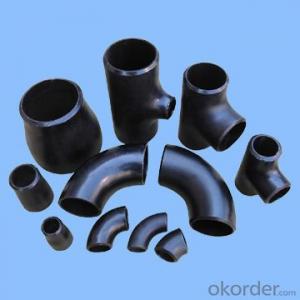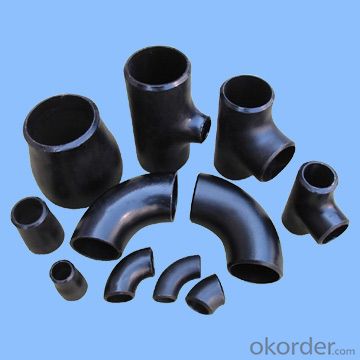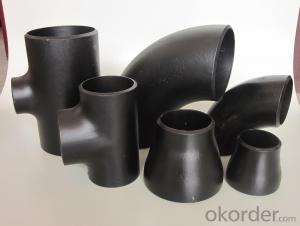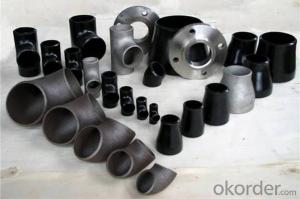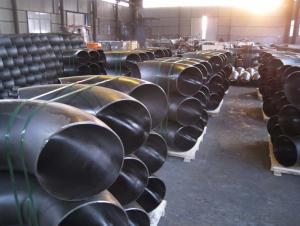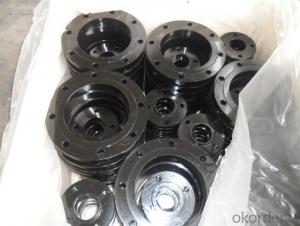CARBON STEEL PIPE FITTINGS ASTM A234 FLANGE - 24'' 26''
- Loading Port:
- Tianjin
- Payment Terms:
- TT OR LC
- Min Order Qty:
- 1 m.t.
- Supply Capability:
- 30000 m.t./month
OKorder Service Pledge
OKorder Financial Service
You Might Also Like
Specifications
1.we produce seamless steel pipe
2.size:48-219*4.5-45mm
3.ISO 9000 approved
4.Market:south/east Asia,Mid-east,South America
seamless steel pipe
Material J55 K55 N80 L80 P110.etc
Standard ASTM JIS
Usage conveying oil gas ,oil pipe line,pipe material collar,oil nature gas,
Packing wooden cases or wooden pallet ,export standard package
Others:Special design available according to requirement
Anti-corrosion available and high temperature resistence
Delivery time 30days
Payment term T/T L/C
Name | API oil casing pipe | ||||
Out Diameter | Wall thickness | Material | Thread | Length | |
in | mm | ||||
5 1/2 | 139.7mm | 6.20 | J55/K55/N80 | LTC/STC/BTC | R2 |
6.98 | |||||
7.72 | |||||
9.17 | |||||
10.54 | |||||
6 5/8 | 168.28mm | 7.32 | J55/K55/N80 | LTC/STC/BTC | R2 |
8.94 | |||||
10.59 | |||||
12.06 | |||||
12.06 | |||||
8 5/8 | 219.08 | 8.94 | H40 | S/L/B | 9 5/8R2 |
J55/K55 | S/L/B | ||||
10.6 | L80 | L/B | |||
12.7 | L80 C95 | L/B | |||
14.15 | P110 | L/B | |||
9 5/8 | 244.48 | 13.84 | J55 K55 | R2 | |
15.11 | L80 | L/B | |||
10 3/4 | 273.05 | 11.43 | J55 K55 | S/B/E | R2 |
13.84 | P110 | S/B | |||
15.11 | P110 | S/B | |||
11 3/4 | 298.45 | 12.19 | J55 K55 | S/B | R2 |
10.96 | J55 K55 | S/B | |||
13 3/8 | 339.72 | 12.19 | J55 K55 L80 | S/B | R2 |
10.92 | J55 K55 | S/B | |||
13.06 | L80 | S/B | |||
Coupling and thread can be required according to customer requirment
- Q: How do steel pipes perform in corrosive environments?
- Steel pipes perform well in corrosive environments due to their inherent resistance to corrosion. Steel is a durable and strong material that can withstand exposure to various corrosive elements such as moisture, chemicals, and saltwater. Additionally, steel pipes can be further protected through coatings or linings to enhance their resistance to corrosion, making them a reliable choice for applications in corrosive environments.
- Q: What are the advantages of using steel pipes in irrigation systems?
- There are several advantages of using steel pipes in irrigation systems. Firstly, steel pipes are highly durable and can withstand harsh weather conditions and heavy loads, ensuring a long lifespan. Secondly, they have a high tensile strength, which means they can handle high pressure and water flow rates without the risk of bursting or leaking. Additionally, steel pipes are resistant to corrosion, which is crucial for maintaining water quality and preventing contamination. Lastly, steel pipes are easy to install and maintain, making them cost-effective in the long run.
- Q: How are steel pipes transported and stored?
- Steel pipes are typically transported using specialized trucks, trains, or ships, depending on the distance and quantity. They are often stacked and secured with straps or chains to prevent movement during transportation. Once at the storage site, steel pipes are usually stored in an organized manner, either horizontally on racks or vertically in designated areas. It is crucial to keep them protected from moisture, corrosion, and physical damage, so they are often covered or stored indoors.
- Q: What are the different types of steel pipe connections for oil and gas pipelines?
- There are several different types of steel pipe connections used for oil and gas pipelines, including threaded connections, welded connections, flanged connections, and grooved connections. Each type has its own advantages and is selected based on factors such as the size of the pipeline, the pressure and temperature requirements, and the specific application.
- Q: How are steel pipes used in the manufacturing of boilers and heat exchangers?
- Steel pipes are an essential component in the manufacturing of boilers and heat exchangers due to their unique properties and capabilities. These pipes are specifically designed to withstand high temperatures, pressures, and corrosive environments, making them ideal for these applications. In the manufacturing process of boilers, steel pipes are used to construct the main body or shell of the boiler. This shell contains the water or steam that is heated to generate heat or produce steam for various industrial processes. The steel pipes used in boilers are typically seamless or welded, with precise dimensions and high strength to ensure structural integrity and prevent leaks. Heat exchangers, on the other hand, are devices used to transfer heat between two fluids, often with different temperatures. Steel pipes are employed in heat exchangers as the primary medium for transferring heat. The pipes are usually arranged in a pattern, allowing the hot fluid to pass through one set of pipes while the cold fluid passes through another set. This arrangement enables efficient heat transfer between the two fluids. The use of steel pipes in boilers and heat exchangers offers several advantages. Firstly, steel pipes have excellent thermal conductivity, allowing for efficient heat transfer between the fluid and the surrounding environment. Secondly, steel pipes have high tensile strength and can withstand high pressure, ensuring the safety and reliability of the equipment. Thirdly, steel pipes are resistant to corrosion, which is crucial in environments where the fluids being processed are corrosive or contain impurities. Moreover, steel pipes can be easily fabricated and customized to meet the specific requirements of boilers and heat exchangers. They can be manufactured in various sizes, lengths, and thicknesses to accommodate different applications. Additionally, steel pipes can be coated or lined with materials such as ceramic or epoxy to provide further protection against corrosion or abrasion. In summary, steel pipes play a vital role in the manufacturing of boilers and heat exchangers. Their unique properties, including high strength, thermal conductivity, and corrosion resistance, make them the ideal choice for these applications. The use of steel pipes ensures the efficient operation, safety, and longevity of boilers and heat exchangers in various industrial processes.
- Q: Are steel pipes suitable for underground irrigation pumping?
- Yes, steel pipes are generally suitable for underground irrigation pumping. They are durable, resistant to corrosion, and can withstand high pressure. Additionally, steel pipes provide excellent flow capacity, ensuring efficient water distribution for irrigation purposes.
- Q: What is the role of steel pipes in the aerospace industry?
- Steel pipes in the aerospace industry serve various critical roles, primarily in the construction of aircraft structures and engines. They are commonly used for fuel and hydraulic systems, as well as for carrying pressurized air and gases. Steel pipes provide strength, durability, and resistance to high temperatures and pressure, ensuring the safety and reliability of aerospace components. Additionally, they contribute to fuel efficiency by reducing weight and minimizing fuel leakage.
- Q: How are steel pipes used in plumbing?
- Steel pipes are commonly used in plumbing systems to transport water, gas, and waste materials. They are durable, strong, and resistant to corrosion, making them suitable for both residential and commercial plumbing applications. Steel pipes are typically used for water supply lines, drainage systems, and venting pipes, ensuring efficient and reliable plumbing infrastructure.
- Q: What are the different types of steel pipe tees?
- There are three main types of steel pipe tees: equal tee, reducing tee, and barred tee.
- Q: What are the applications of steel pipes in the automotive industry?
- Steel pipes are used in the automotive industry for a variety of applications, including exhaust systems, fuel lines, and structural components. They provide durability, corrosion resistance, and high strength, making them ideal for withstanding the harsh conditions and heavy loads experienced in automotive applications. Steel pipes also offer flexibility in design and can be tailored to meet specific requirements, ensuring efficient and reliable performance in vehicles.
Send your message to us
CARBON STEEL PIPE FITTINGS ASTM A234 FLANGE - 24'' 26''
- Loading Port:
- Tianjin
- Payment Terms:
- TT OR LC
- Min Order Qty:
- 1 m.t.
- Supply Capability:
- 30000 m.t./month
OKorder Service Pledge
OKorder Financial Service
Similar products
Hot products
Hot Searches
Related keywords
